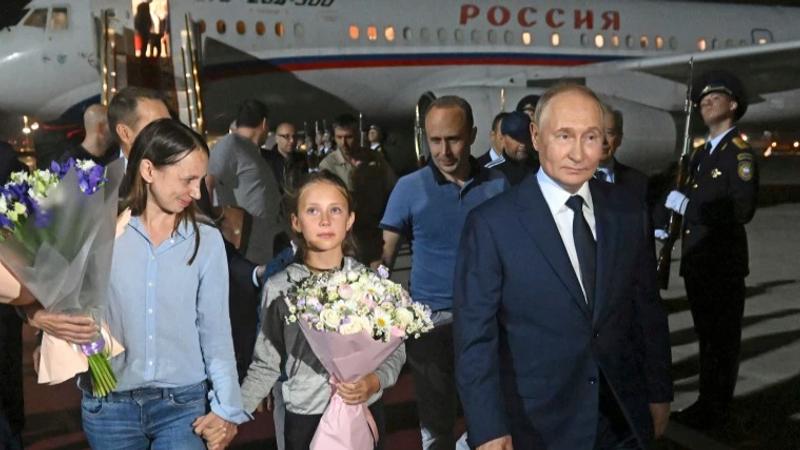Published 18:43 IST, August 3rd 2024
Russian Spies’ Kids Learn About Their Nationality On Flight, Unfamiliar with Putin: Kremlin Claims
The children do not speak Russian and were unfamiliar with Russian President Vladimir Putin, who was greeting them on the tarmac upon their arrival.

Stunning new details have emerged about the largest prisoner swap between ‘East’ and ‘West’ since the Cold War, with the Kremlin disclosing for the first time that some of the Russians involved were undercover intelligence officers. Remarkably, the children of one such couple only discovered their Russian nationality during the flight to Moscow. One could almost be forgiven for mistaking the historic prisoner swap with a scene from ‘The Americans’ (a US drama based on Russian illegals operating in US).
Kremlin spokesman Dmitry Peskov confirmed that Artem and Anna Dultsev, who were released from detention in Slovenia, were undercover Russian intelligence agents known as "illegals." Posing as Argentine expatriates, the Dultsevs operated from Ljubljana, Slovenia, since 2017, relaying orders from Moscow to other sleeper agents. They were arrested on espionage charges in 2022.
Russian spy couple's kids learned their nationality on the flight
The Dultsevs' two children, who accompanied them on the flight from Ankara, Turkey, to Moscow’s Vnukovo Airport, were unaware of their true nationality until they were en route to Russia. According to Peskov, the children did not speak Russian and were unfamiliar with Russian President Vladimir Putin, asking who was greeting them upon arrival. At the tarmac, the Russian President greeted the kids in Spanish.
Peskov explained, “That’s how illegals work, and that’s the sacrifices they make because of their dedication to their work.” Putin himself served as an intelligence officer once. He holds spies in high regard.
Here is what you need to know about ‘the illegals’
Russia’s illegal intelligence program, also known as the "illegal residency" or "illegals" program, traces its origins to the early days of the Soviet Union. During the Cold War, the Soviet intelligence agency, the KGB, established a sophisticated network of undercover operatives who posed as ordinary civilians while gathering sensitive information and conducting espionage activities. These operatives were known as “illegals” because they operated without official diplomatic cover, unlike typical intelligence agents.
The program aimed to infiltrate foreign societies and collect intelligence on various aspects, including military, political, and economic developments. The illegals lived under false identities and worked in civilian jobs, blending into the host society to avoid detection.
During the Cold War, the illegals program was a crucial element of Soviet intelligence operations. The KGB established numerous illegals networks across Western countries and allied nations. These agents were tasked with penetrating key sectors such as government, defense, and industry.
After the collapse of the Soviet Union in 1991, Russia’s intelligence services, including the successor to the KGB, the FSB (Federal Security Service), continued to operate in a similar manner but with reduced scale and resources. The end of the Cold War did not diminish Russia’s interest in espionage; rather, it adapted to new geopolitical realities.
In the 2000s, with Vladimir Putin's rise to power, there was a resurgence of covert operations, including the use of illegals. Putin, a former KGB officer, revitalized many aspects of Soviet-era intelligence practices. The FSB, along with the SVR (Foreign Intelligence Service), continued to employ illegals to gather intelligence and conduct operations in key Western countries.
Here is what you need to know about the prisoner swap
The historic swap, which took place on Thursday, involved 24 prisoners, with 26 people, including the Dultsevs’ children, changing planes on the tarmac in Ankara. While journalists Evan Gershkovich and Alsu Kurmasheva, along with former Marine Paul Whelan, were welcomed by their families and President Joe Biden in Maryland, Putin greeted the Russian returnees at the Moscow airport, promising them state awards and a discussion about their futures.
The details of the swap highlight the high-stakes nature of international espionage and the personal sacrifices made by those involved in covert operations.
Updated 19:44 IST, August 3rd 2024




